 |
| Photo of mask with tear streaks by Joseph_Berardi at https://pixabay.com/photos/sculpture-mask-tears-bronze-sadness-2481969/ |
U.S. History Week 10
Jacksonian Democracy, 1820-1840
I designed a quiz related to chapter 10 at the bottom of this article.
Directions for the quiz:
- Scroll down & click on the first thumbnail to enlarge to full screen.
- Choose an answer for each question.
- Click on the graphic to advance to the next screen.
- The correct answer is on the screen following the question.
- Compare your answers with those provided.
- If you cannot easily see the correct answer, check the captions.
An interactive version is available on Kahoot!
Search for this week’s topic by Katrena to find it.
Review the following Chapter 10 pages:
- Introduction
- A New Political Style: From John Quincy Adams to Andrew Jackson
- The Rise of American Democracy
- The Nullification Crisis and the Bank War
- Indian Removal
- The Tyranny and Triumph of the Majority
- Key Terms
- Summary
Practice learning Chapter 10 Key Terms on Quizlet.
Week 10 Videos:
- History Brief: The Election of 1824 (6:42)
- Crash Course: Age of Jackson (15:04)
- What Life on the Trail of Tears Was Like (10:52)
- The Tariff of Abominations (1:40)
- Contrasting the Jacksonian Democrats with the Whigs (2:27)
- Panic of 1837 (9:13)
- The Life of William Henry Harrison Song (2:21)
Review the following information featuring the U.S.:
- Iowa (8:15)
- Kansas (6:45)
- James Buchanan (1:29)
- James Buchanan and the Prince of Wales
- White House: Harriet Rebecca Lane Johnston
- 30 Presidential Nicknames - Explained!
Additional Resources:
Thanks for visiting my Student Survive 2 Thrive blog!
Find additional resources through my site map, topics tabs, or search bar.
Here are some of my articles you may find helpful this week:
 |
| U.S. History Week 10 A New Political Style from John Quincy Adams to Andrew Jackson |
 |
| Created by Katrena All rights reserved. |
 |
| The correct answer is any of these. |
 |
| By early 1800s, voting rights were extended to all ____, even if they did not own property. Answer choices include: women, white males, indigenous people, free black males |
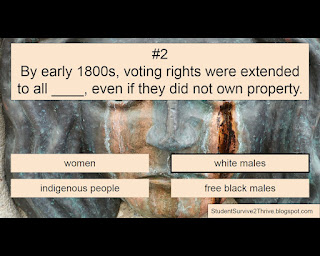 |
| The correct answer is white males. |
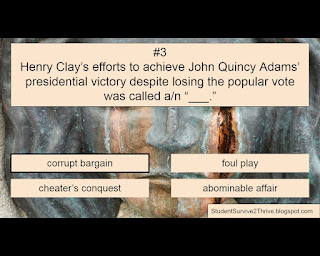 |
| The correct answer is corrupt bargain. |
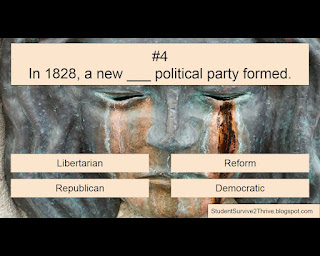 |
| In 1828, a new ___ political party formed. Answer choices include: Libertarian, Reform, Republican, Democratic |
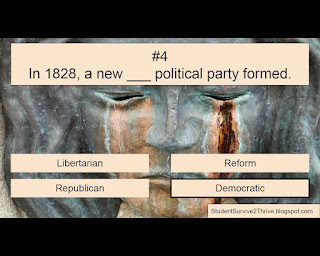 |
| The correct answer is Democratic. |
 |
| What was Andrew Jackson’s nickname? Answer choices include: Old Sink or Swim, Old Granny, Old Hickory, His Accidency |
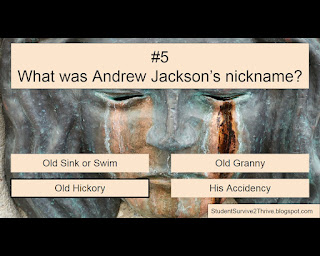 |
| The correct answer is Old Hickory. |
 |
| ____, or Spoils System, is when an incoming President removes civil officers & hand-picks replacements. Answer choices include: Changing of the guard, Pinch hitter, Anarchy, Rotation in office |
 |
| The correct answer is:Rotation in office. |
 |
| President Andrew Jackson’s informal advisors were nicknamed the ___. Answer choices include: Coin Commanders, Petticoat Jacksons, Donkey Advisors, Kitchen Cabinet |
 |
| The correct answer is Kitchen Cabinet. |
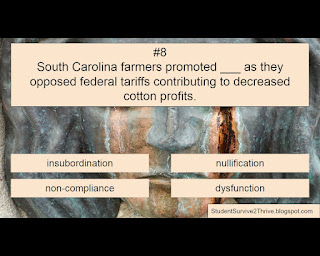 |
| South Carolina farmers promoted ___ as they opposed federal tariffs contributing to decreased cotton profits. Answer choices include: insubordination, nullification, non-compliance, dysfunction |
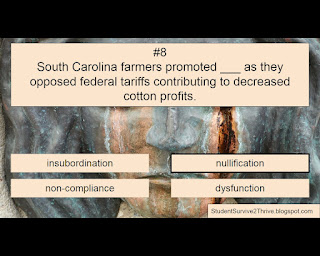 |
| The correct answer is nullification. |
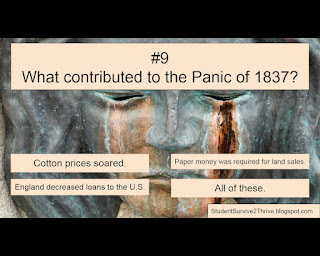 |
| What contributed to the Panic of 1837? Answer choices include: Cotton prices soared. Paper money was required for land sales. England decreased loans to the U.S. All of these. |
 |
| The correct answer is: England decreased loans to the U.S. |
 |
| ___ was an artist who depicted Native people as exotic savages in an aboriginal state. Answer choices include: George Catlin, Carl Sweezy, Mason Locke Weems, Henry Clay |
 |
| The correct answer is George Catlin. |
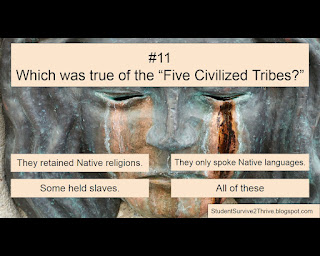 |
| Which was true of the “Five Civilized Tribes?” Answer choices include: They retained Native religions; They only spoke Native languages, Some held slaves; All of these |
 |
| The correct answer is: Some held slaves. |
 |
| What was discovered in Cherokee territory in 1828 in northern Georgia? Answer choices include: obsidian, gold, oil, silver |
 |
| The correct answer is gold. |
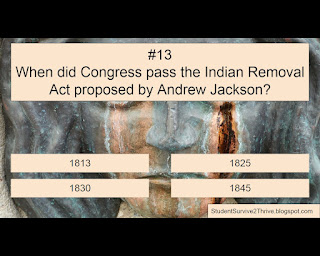 |
| When did Congress pass the Indian Removal Act proposed by Andrew Jackson? Answer choices include: 1813, 1825, 1830, 1845 |
 |
| The correct answer is 1830. |
 |
| The following supported the Cherokee right to live in America as an independent nation EXCEPT ___. Answer choices include: William Wirt, Andrew Jackson, Daniel Webster, Henry Clay |
 |
| The correct answer is Andrew Jackson. |
 |
| Worchest v. Georgia centered on a law stating that non-Native people could not live on Native lands. Answer choices include: true, false |
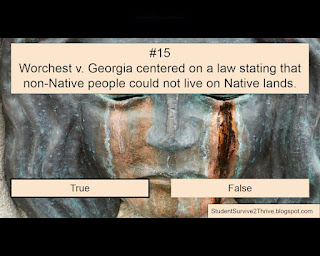 |
| The correct answer is true. |
 |
| Approximately 4,000 Native men, women, and children died on the ____, a forced migration to Oklahoma. Answer choices include: Great Migration, Apartheid, Bataan Death March, Trail of Tears |
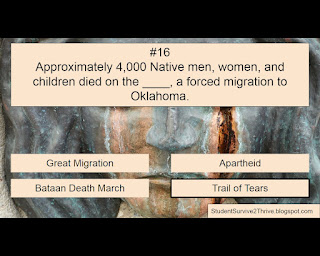 |
| The correct answer is Trail of Tears. |
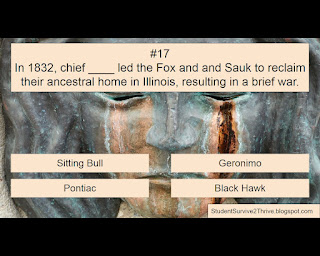 |
| In 1832, chief ____ led the Fox and and Sauk to reclaim their ancestral home in Illinois, resulting in a brief war. Answer choices include: Sitting Bull, Geronimo, Pontiac, Black Hawk |
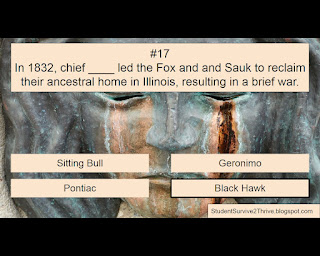 |
| The correct answer is Black Hawk. |
 |
| Who wrote of the tyranny of the majority in Democracy of America? Answer choices include: Charles Dickens, Alexis de Tocqueville, Henry David Thoreau, Edgar Allen Poe |
 |
| The correct answer is Alexis de Tocqueville. |
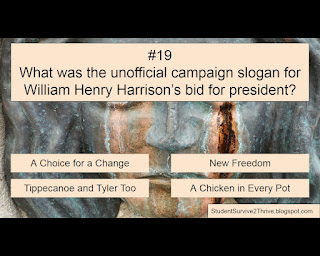 |
| What was the unofficial campaign slogan for William Henry Harrison’s bid for president? Answer choices include: A Choice for a Change, New Freedom, Tippecanoe and Tyler Too, A Chicken in Every Pot |
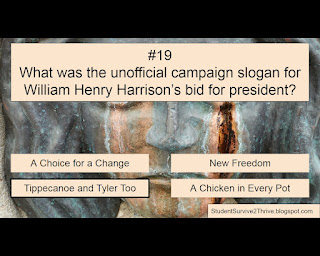 |
| The correct answer is Tippecanoe and Tyler Too. |
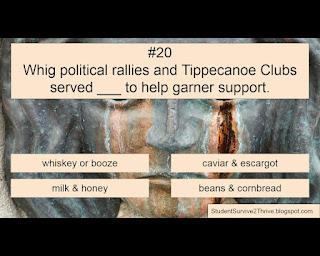 |
| Whig political rallies and Tippecanoe Clubs served ___ to help garner support. Answer choices include: whiskey or booze, caviar & escargot, milk & honey, beans & cornbread |
 |
| The correct answer is whiskey or booze. |
 |
| Find more resources at StudentSurvive2Thrive.blogspot.com |

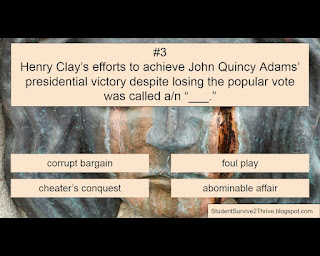
No comments:
Post a Comment
Thanks for reading my article and sending your comment! Please note that I do not place links to other web sites on this blog.
Note: Only a member of this blog may post a comment.